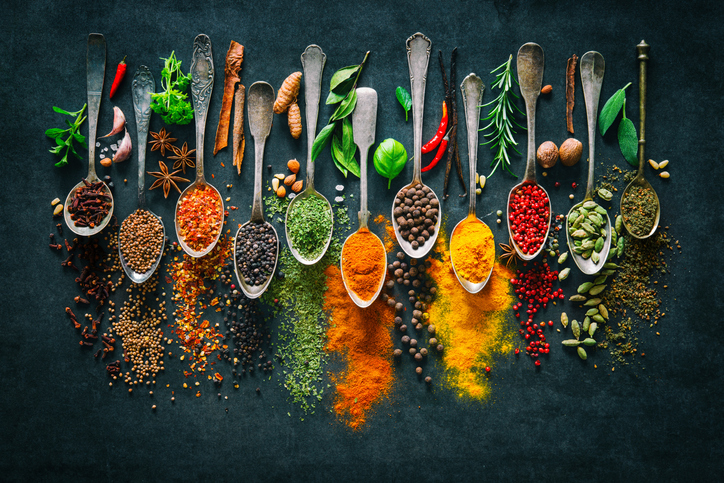The holiday season is one of the hardest times of the year to resist salty, fatty, sugary foods. Who doesn’t want to enjoy the special dishes and treats that evoke memories and meaning — especially during the pandemic? Physical distancing and canceled gatherings may make you feel that indulging is a way to pull some joy out of the season.
But stay strong. While it’s okay to have an occasional bite or two of marbled roast beef, buttery mashed potatoes, or chocolate pie, gorging on them frequently can lead to weight gain, and increased blood pressure, blood sugar, and “bad” LDL cholesterol.
Instead, skip the butter, cream, sugar, and salt, and flavor your foods with herbs and spices.
The bounty of nature’s flavor-makers go beyond enticing tastes, scents, and colors. Many herbs and spices contain antioxidants, flavonoids, and other beneficial compounds that may help control blood sugar, mood, and inflammation.
Amp up holiday foods with herbs and spices
Try flavoring your foods with some of the herbs and spices in the list below. Play food chemist and experiment with combinations you haven’t tried before. The more herbs and spices you use, the greater the flavor and health rewards. And that’s a gift you can enjoy all year through.
Allspice: Use in breads, desserts, and cereals; pairs well with savory dishes, such as soups, sauces, grains, and vegetables.
Basil: Slice into salads, appetizers, and side dishes; enjoy in pesto over pasta and in sandwiches.
Cardamom: Good in breads and baked goods, and in Indian dishes, such as curry.
Cilantro: Use to season Mexican, Southwestern, Thai, and Indian foods.
Cinnamon: Stir into fruit compotes, baked desserts, and breads, as well as Middle Eastern savory dishes.
Clove: Good in baked goods and breads, but also pairs with vegetable and bean dishes.
Cumin: Accents Mexican, Indian, and Middle Eastern dishes, as well as stews and chili.
Dill weed: Include in potato dishes, salads, eggs, appetizers, and dips.
Garlic: Add to soups, pastas, marinades, dressings, grains, and vegetables.
Ginger: Great in Asian and Indian sauces, stews, and stir-fries, as well as beverages and baked goods.
Marjoram: Add to stews, soups, potatoes, beans, grains, salads, and sauces.
Mint: Flavors savory dishes, beverages, salads, marinades, and fruits.
Nutmeg: Stir into fruits, baked goods, and vegetable dishes.
Oregano: Delicious in Italian and Mediterranean dishes; it suits tomato, pasta, grain dishes, and salads.
Parsley: Enjoy in soups, pasta dishes, salads, and sauces.
Pepper (black, white, red): Seasons soups, stews, vegetable dishes, grains, pastas, beans, sauces, and salads.
Rosemary: Try it in vegetables, salads, vinaigrettes, and pasta dishes.
Sage: Enhances grains, breads, dressings, soups, and pastas.
Tarragon: Add to sauces, marinades, salads, and bean dishes.
Thyme: Excellent in soups, tomato dishes, salads, and vegetables.
Turmeric: Essential in Indian foods; pairs well with soups, beans, and vegetables.
The post 21 spices for healthy holiday foods appeared first on Harvard Health Blog.
, The holiday season is probably the hardest time of year to resist rich, indulgent foods, but too many salty, fatty, sugary choices can harm your health. Instead, try adding natural flavor to holiday foods with herbs and spices, many of which contain substances that have a beneficial effect on health.
The post 21 spices for healthy holiday foods appeared first on Harvard Health Blog., Read More

